Robert H. Williams, 1948-1964
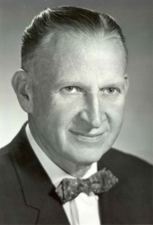 The first chair of the Department of Medicine, Robert H. Williams, came to Seattle in 1948 to head the newly established department after spending 14 years at Johns Hopkins, Vanderbilt, and Harvard.
The first chair of the Department of Medicine, Robert H. Williams, came to Seattle in 1948 to head the newly established department after spending 14 years at Johns Hopkins, Vanderbilt, and Harvard.
Dr. Williams was an internationally recognized endocrinologist with a deep regard for the values of education and medical research that set the standards for subsequent development of the department.
He recruited a small, promising, and ultimately highly successful faculty who rapidly led the department to a position of leadership in academic medicine.
Under Dr. Williams’ leadership, the department grew to include ten divisions and rapidly expanding programs in biomedical research. By 1960, departmental research support from grants exceeded $2 million.
Robert G. Petersdorf, 1964-1980
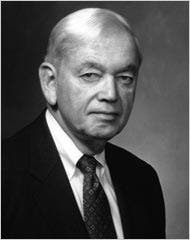 Dr. Robert G. Petersdorf was appointed chair of the department in 1964 after serving as chief of medicine at Harborview Medical Center.
Dr. Robert G. Petersdorf was appointed chair of the department in 1964 after serving as chief of medicine at Harborview Medical Center.
A graduate of Yale Medical School, he had come to the UW in 1960 after holding faculty appointments at Yale and Johns Hopkins.
During the 1960's and 1970's, the department saw tremendous growth in size and scope. When Dr. Petersdorf began his chairmanship, there were 69 full-time faculty members, 66 residents, and 82 research fellows.
By 1978, the department had grown to 322 full-time departmental faculty, 118 residents, and 148 research fellows. The number of divisions expanded to 13, and the Primary Care Internal Medicine program was established.
Faculty research made enormous strides during this period, along with the creation of research centers in diabetes, reproductive medicine, inherited diseases, and gerontology.
Major advances were made in the understanding of anemia, familial combined hyperlipidemia, thalassemia, acute respiratory distress syndrome, rheumatoid arthritis, and numerous other complex conditions. Department investigators developed home parenteral nutrition, the treadmill test, out-of-hospital use of CPR, and further refinements of bone marrow transplantation and dialysis.
Philip J. Fialkow, 1980-1990
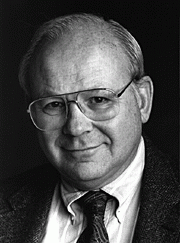 When Dr. Petersdorf accepted a position at Harvard, Dr. Philip Fialkow became chair.
When Dr. Petersdorf accepted a position at Harvard, Dr. Philip Fialkow became chair.
A graduate of Tufts Medical School, Dr. Fialkow trained in medicine and genetics at the University of California, San Francisco, and at UW. He had served as chief of medicine at the Seattle VA since 1974.
Under Dr. Fialkow’s leadership, NIH grants to the department grew to over $24 million annually, and total outside research funds stood at $38 million by 1988.
New programs were established in occupational medicine and nutrition, and the Division of Ambulatory Medicine became the Division of General Internal Medicine, incorporating research in health services, clinical epidemiology, ethics, decision analysis, and other areas.
Paul G. Ramsey, 1990-1997
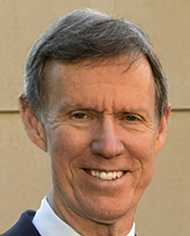 Dr. Fialkow became dean of the University of Washington School of Medicine, and Dr. Paul G. Ramsey was appointed as chair of the department after serving for 18 months as acting chair.
Dr. Fialkow became dean of the University of Washington School of Medicine, and Dr. Paul G. Ramsey was appointed as chair of the department after serving for 18 months as acting chair.
Dr. Ramsey completed his medical school and residency training at Harvard and came to the University of Washington in 1978 to complete fellowship training.
Under Dr. Ramsey's direction, federal research funds to the department increased to $40 million, and total outside research funds increased to $50 million.
The Division of Emergency Medicine was created, and the Neurology Division became a separate department. An affiliation was completed with the Fred Hutchinson Cancer Research Center, ambulatory clinics increased in number and size, and research programs in molecular medicine, health services research, and AIDS/sexually transmitted diseases grew dramatically.
In July 1997, Dr. Ramsey became vice president for medical affairs and dean of the University of Washington School of Medicine. Dr. Henry Rosen, associate chair of the department, was named acting chair.
WIlliam J. Bremner, 1998-2018
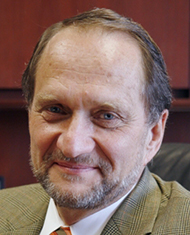 In December 1998, Dr. William Bremner, who had been vice chair of the department since 1987, became the fifth chair of the Department of Medicine.
In December 1998, Dr. William Bremner, who had been vice chair of the department since 1987, became the fifth chair of the Department of Medicine.
Dr. Bremner is a graduate of Harvard University and the UW School of Medicine, where he went on to complete residency and fellowship training before earning a PhD from Monash University in Melbourne, Australia.
From 1979 to 1987, Dr. Bremner served as chief of the Endocrine Section, and from 1987 to 1998 as chief of medicine service at Seattle's VA Medical Center.
A specialist in male reproductive endocrinology, he is co-founder and director of the UW's Center for Research in Reproduction and Contraception.
Over his tenure, the department grew from 400 full-time faculty to over 1000, and the numbers of full-time clinical faculty increased from 14 to over 200.
Clinical programs expanded dramatically, many new research programs and institutes were initiated and expanded, and research funding more than tripled.
Teaching and training programs increased markedly, both in Seattle and throughout the WWAMI region, with numbers of volunteer clinical faculty reaching over 1000.
Endowed chairs and professorships increased from 11 to 47, and the number of female division heads increased from zero to six.
Barbara H. Jung, 2019-2024
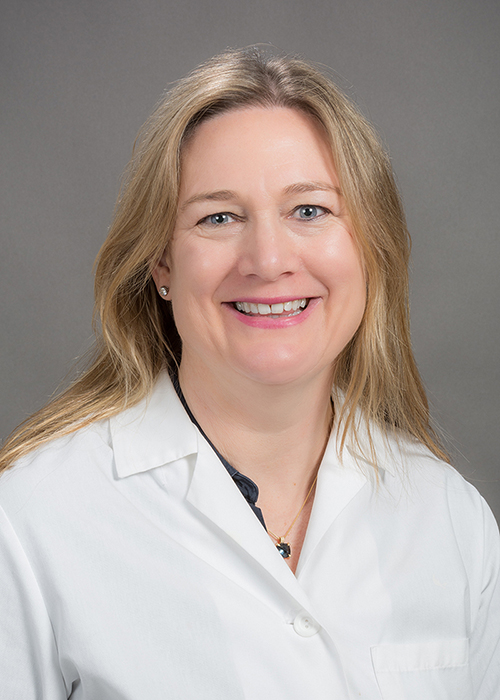 Dr. Barbara Jung became the sixth chair of the Department of Medicine on September 1, 2019.
Dr. Barbara Jung became the sixth chair of the Department of Medicine on September 1, 2019.
As a practicing gastroenterologist and physician-scientist, her expertise in gastrointestinal disease is extensive, and her research interests range from basic to clinical science.
She completed her medical degree with thesis at the Ludwig-Maximilians University in Munich, Germany, followed by post-doctoral studies in colon cancer and internal medicine residency and gastroenterology fellowship at the University of California in San Diego.
Dr. Jung’s research interests include both clinical and basic research, and she has a strong record of fostering research collaboration between basic, translational and clinical research.
Her NIH-funded laboratory centers on TGFb family member signaling in GI disease, including colorectal cancer and pancreatitis.
She is an academician at heart and passionate about leading with empathy and through the empowerment of others, and training the next generation of diverse clinicians, educators, scientists and leaders.



